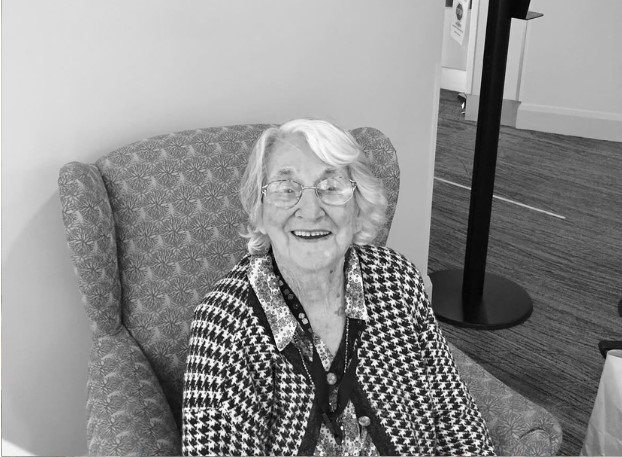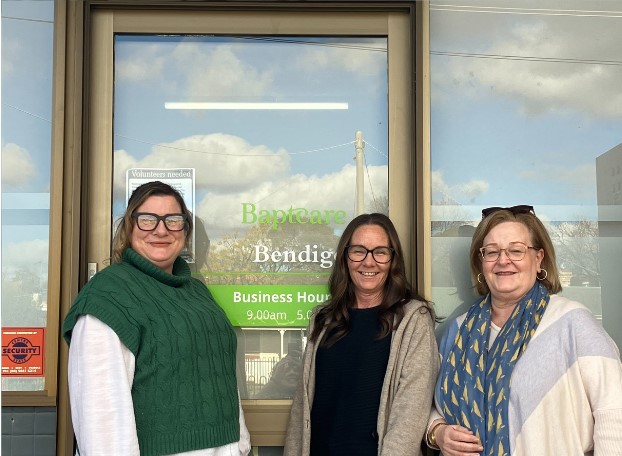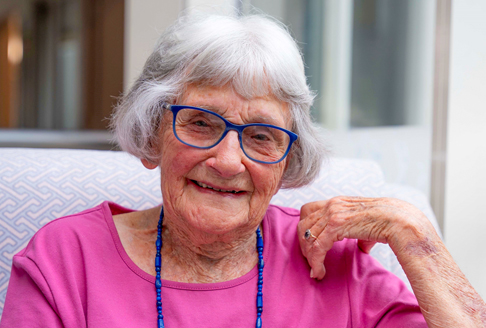Ask 96-year-old Jean Giese what matters in life, and she answers without hesitation.
“In the end, it’s all about relationships,” she says. “Connecting with people. That’s what’s important.”
A fairly recent resident of Baptcare’s Karana residential aged care community, Jean has discovered that several staff members grew up in Nepal, so she talks with them about what she saw and learned while trekking in that country.
Her decades of bushwalking were not just about experiencing nature but also linking with others of like mind. “I was punching above my weight with my bushwalking and made lots of younger friends. They still stay in touch and come and visit. I recommend young friends to everyone!
“I am a Life Member of the Melbourne Bushwalkers. I’m not sure what my favourite walks have been, but Nepal was wonderful, and so are the classic walks in Tasmania. The mountains in Austria and Switzerland are also special.”
Jean was born in Perth and trained as a nurse in Fremantle. She moved to Melbourne with her husband, Methodist Minister Roland Giese, and three children in 1965.
Roland was passionate about music and social justice. He died aged 50, several years before the Methodist Church became part of the Uniting Church. “He would have loved that. He was what we called an ecumaniac.”
Jean is a Life Member of the Australian Labor Party and retains a strong interest in politics. “I don’t talk a lot about it here – we all know you should steer clear of religion and politics in conversation – but I feel strongly that we need things to be fairer between the haves and the have nots. I can also see such a divide between young and old at the moment.”
An enthusiastic attender of live arts events, Jean barely missed a Melbourne Theatre Company show in 45 years, as well as enjoying opera and ballet. The best performance she’s ever seen? Katharine Hepburn playing Katherina in The Taming of the Shrew on an Australian tour in 1955.
In 2002, Jean was awarded an OAM ‘For service to education through the Hawthorn campus of the University of the Third Age, and to the community,’ recognition of her leadership and engagement.
“What does life mean? We are all looking for explanations. I don’t know the answer. But relationships, as I said, are what matters.
“I am very happy to be here at Karana, with lots of people to chat with. I used to visit here, I had my name down for a long time, and I’m very happy to be here now.”
Community news
-

Dressmaker, traveller, Bulldogs fan and volunteer – Thelma turns 100!
Thelma Powell, beloved resident and former volunteer at Westhaven, turned 100 on 9th February 2026 with balloons, party hats, and cake! Surrounded by her family, care team, the local MP, and Mayor, as well as a representative from her beloved footy team, the Bulldogs, it was a day to remember.
- 13 Feb 2026
-

Team Spotlight: Home Start, Mother Goose and Supported Playgroup Team in Bendigo
Baptcare runs the Home-Start, Supported Playgroup, and Parent-Child Mother Goose Programs in Bendigo. Jane, Home-Start Team Leader; Angie, Group Facilitator, Mother Goose Program and Supported Playgroup; and Jess, Group Facilitator, Mother Goose Program and Supported Playgroup, are our wonderful team members, dedicated to helping families and connecting them with strong support within the local Bendigo and Macedon Ranges communities. Keep reading to learn more about these exceptional employees, their work, and why they love what they do.
- 30 Jan 2026
-

Staff Spotlight | Lois Yamuta – Project Lead, Living Well Together
What inspired you to work in aged care and how did you come to lead the ‘Living Well Together’ program? My career in aged care started in New Zealand. I was studying Healthcare Management, where I was also introduced to aged care nursing, and the rest is history!
- 28 Jan 2026

